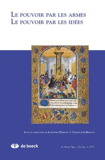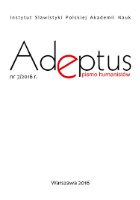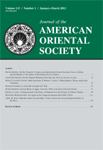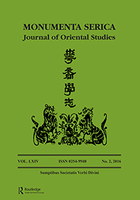
Acta Orientalia Academiae Scientiarum Hungaricae
metrics 2024
Unveiling New Perspectives in Oriental Studies
Introduction
Acta Orientalia Academiae Scientiarum Hungaricae, published by AKADEMIAI KIADO ZRT, stands as a prominent peer-reviewed journal in the fields of Cultural Studies, History, and Literature. Since its inception in 2007 and continuing through 2024, the journal has established itself as an essential resource for scholars and practitioners, achieving Q1 rankings across multiple categories in 2023, highlighting its impact and relevance. With a strong presence in Scopus rankings, particularly in Literature and Literary Theory (Rank #269/1106, 75th Percentile) and History (Rank #738/1760, 58th Percentile), Acta Orientalia serves as a pivotal platform for innovative research that explores the intersections of culture, history, and literary theory. Currently, the journal offers traditional access options, maximizing its reach to a diverse readership. By publishing cutting-edge research, the journal contributes significantly to the academic discourse, fostering a deeper understanding of the complexities inherent in the human experience.
Metrics 2024
 0.30
0.30 0.10
0.10 0.20
0.20 8
8Metrics History
Rank 2024
Scopus
IF (Web Of Science)
JCI (Web Of Science)
Quartile History
Similar Journals

JOURNAL OF INDO-EUROPEAN STUDIES
Unveiling the Rich Tapestry of Language and CultureJOURNAL OF INDO-EUROPEAN STUDIES, published by the Institute for the Study of Man, is a prestigious academic journal dedicated to the interdisciplinary exploration of the Indo-European languages and cultures. With an ISSN of 0092-2323, this journal has gained notable recognition within the fields of Anthropology, Archaeology, History, Linguistics, and Literature, as evidenced by its commendable placement in the Category Quartiles for 2023. Specifically, it ranks in Q2 in History and Literature, and maintains a strong presence in Q3 across various other humanities disciplines. Though it ceased coverage in Scopus in 2021, it continues to serve as a vital resource for scholars seeking to delve into the complexities of Indo-European studies, presenting both theoretical and empirical research. The journal is particularly significant for researchers aiming to address contemporary questions while reflecting on historical contexts. With a focus on rigorous scholarship, it plays an essential role in fostering discourse among academics and students alike, and remains a crucial platform for contributions within its diverse scope.

MOYEN AGE
Exploring the Depths of Medieval ThoughtMOYEN AGE is a distinguished academic journal published by LE MOYEN AGE BOECK & LARCIER S A in Belgium, focused on the multifaceted disciplines of History, Linguistics, and Literature. With its ISSN 0027-2841 and E-ISSN 1782-1436, this journal serves as a platform for researchers, professionals, and students alike to engage with scholarly articles that contribute to the understanding of medieval studies. Although currently categorized in the fourth quartile across various fields as of 2023, MOYEN AGE demonstrates a commitment to fostering academic dialogue and exploration around historical linguistics and literary theory. The journal is available via subscription, making it an essential resource for those looking to deepen their knowledge in its scope, which spans from 2001 through 2024. As it continues to evolve, MOYEN AGE remains a relevant source for emerging thinkers and established scholars drawn to the complexities of the medieval era.

Language and Linguistics
Innovating Insights into Language DynamicsLanguage and Linguistics is a leading academic journal published by ACAD SINICA, INST LINGUISTICS, based in Taiwan. Established in 2008, this journal has rapidly gained recognition within the field of linguistics, achieving a commendable ranking of Q2 in the 2023 category quartiles and holding positions in the top percentiles of Scopus rankings for both Arts and Humanities and Social Sciences. With an ISSN of 1606-822X and an E-ISSN of 2309-5067, the journal aims to foster the development of linguistics research by providing a platform for the dissemination of innovative and interdisciplinary studies. While it currently operates on a traditional subscription model, its significant contribution to the advancement of linguistic theory and its applications makes it an invaluable resource for researchers, professionals, and students alike. Spanning converged years from 2008 to 2024, Language and Linguistics continues to shape the dialogue in understanding language phenomena and encourages submissions that push the boundaries of current linguistic knowledge.

Adeptus
Advancing Slavic Studies Through Open DialogueAdeptus is a pioneering open-access journal published by the Polish Academy of Sciences, Institute of Slavic Studies, specializing in Slavic studies and cultural research. Since its inception in 2014, the journal has aimed to foster scholarly dialogue and advance knowledge across various disciplines related to Slavic languages, literature, history, and sociology. With an ISSN of 2300-0783, Adeptus has positioned itself as a vital resource for researchers, professionals, and students engaged in Slavic studies, offering a platform for high-quality, peer-reviewed articles that explore diverse topics within the field. The journal's open-access model promotes accessibility and dissemination of knowledge, making it a significant contributor to the academic landscape. Located in Warsaw, Poland, Adeptus continues to thrive as a key outlet for innovative research, inviting submissions that embody rigorous scholarship and insightful perspectives.

JOURNAL OF THE AMERICAN ORIENTAL SOCIETY
Fostering Dialogue Across Diverse DisciplinesThe JOURNAL OF THE AMERICAN ORIENTAL SOCIETY, published by the American Oriental Society, is a prestigious academic journal based in the United States that serves as a vital resource for researchers and scholars engaged in the fields of Asiatic studies, cultural studies, and broader humanities. Established to foster scholarly communication, this journal presents rigorous peer-reviewed articles and critical analyses that explore the diverse cultural, historical, and linguistic dimensions of the Orient. With an impact factor reflecting its scholarly significance, it occupies a Q3 position in Arts and Humanities (miscellaneous) and a Q2 ranking in Cultural Studies as of 2023. Although it does not currently offer open access, the journal maintains a strong reputation for its scholarly contributions, making it an essential platform for disseminating research findings. By bridging gaps in knowledge and fostering interdisciplinary dialogue, the JOURNAL OF THE AMERICAN ORIENTAL SOCIETY remains a cornerstone for those committed to the exploration of Asian cultural heritage and philosophy, enriching the academic community's understanding in these vital fields.

BULLETIN OF THE SCHOOL OF ORIENTAL AND AFRICAN STUDIES-UNIVERSITY OF LONDON
Navigating the Intricacies of Socio-Political LandscapesBULLETIN OF THE SCHOOL OF ORIENTAL AND AFRICAN STUDIES-UNIVERSITY OF LONDON, published by Cambridge University Press, stands as a pivotal journal in the fields of Cultural Studies and History, with an impressive track record dating back to its inception in 1917. With a current impact factor that places it in the Q2 quartile for both categories, this journal gives voice to a rich tapestry of research dedicated to the complexities of Eastern and African societies. Researchers exploring the nuances of cultural interactions, historical developments, and socio-political dynamics will find this publication invaluable, as it offers peer-reviewed articles that contribute significantly to the academia surrounding these diverse fields. Although the journal is not open access, it continues to attract a dedicated readership due to its rigorous scholarly standards and reputation for quality. The BULLETIN also boasts a noteworthy Scopus ranking, reflecting its influence and reach within the global academic community. Located in the United Kingdom, the journal serves as a hub for international scholarly exchange, encouraging contributions that delve into the rich heritage and contemporary issues of Oriental and African studies.

Journal Asiatique
Navigating the Intersections of Culture, Language, and HistoryJournal Asiatique, published by PEETERS, is a distinguished academic journal based in Belgium with an ISSN of 0021-762X and an E-ISSN of 1783-1504, specifically serving the fields of Cultural Studies, History, Linguistics, and Literature. With a significant impact factor reflected through its categorization in the Q3 quartile for Cultural Studies, History, and Linguistics, and Q2 in Literature and Literary Theory, the journal provides a vital platform for scholarly discourse, encouraging researchers, professionals, and students to contribute to the evolution of these intertwined domains. The journal covers diverse aspects of Asian studies, including cultural, historical, and linguistic perspectives, and has been actively publishing since its establishment. While it does not offer an open-access option, the journal remains an esteemed resource for academic exploration and critical analysis, helping to elevate and disseminate knowledge within its vibrant community.

CENTRAL ASIATIC JOURNAL
Charting New Territories in Central Asian ScholarshipCENTRAL ASIATIC JOURNAL is a distinguished publication dedicated to advancing scholarship in the fields of literature, history, linguistics, and archaeology related to Central Asia. Published by VERLAG OTTO HARRASSOWITZ, this journal serves as a vital platform for researchers, professionals, and students, facilitating the exchange of innovative ideas and insights. Though the journal's direct access options are not available, its rigorous academic standards and substantial contribution to the humanities and social sciences are reflected in its respectable rankings in Scopus. With coverage extending from 2002 to 2018, the journal remains a resourceful archive for historical and contemporary scholarly discourse. The journal’s focus on Central Asian studies makes it an essential asset for those looking to deepen their understanding of this culturally rich and historically significant region.

LATOMUS
Where History Meets Scholarly DiscourseLATOMUS is a distinguished academic journal published by Peeters in Belgium, offering a rich platform for scholarly discourse in the fields of Classics, Archaeology, History, Literature, and Linguistics. With the ISSN 0023-8856 and E-ISSN 2294-4427, it has established itself as an essential resource for researchers and professionals seeking to contribute to and engage with critical debates within these disciplines. While not an Open Access journal, LATOMUS is recognized for its robust impact in the academic community, achieving Q2 and Q3 rankings across various categories, including Classics and Archaeology, according to the latest 2023 evaluations. The journal publishes articles that span a range of topics relevant to antiquity and its influences, making it a vital resource for those exploring historical narratives and linguistic developments. As a publication dedicated to advancing scholarly knowledge since its inception in 1971, LATOMUS continues to serve as a cornerstone of academic inquiry within the humanities, promoting intellectual engagement and disseminating high-quality research in its converged years from 1971 to 1974, 1980, and from 2002 to the present.

Monumenta Serica-Journal of Oriental Studies
Cultivating Academic Excellence in Oriental StudiesMonumenta Serica - Journal of Oriental Studies is a prestigious publication dedicated to advancing knowledge in the fields of cultural studies, history, literature and literary theory, philosophy, and religious studies. Published by Routledge Journals, Taylor & Francis Ltd, this journal boasts an impressive distribution since its inception in 1948, providing a rich repository of scholarly articles that explore the multifaceted dimensions of Oriental studies. Recognized in the Q1 and Q2 quartiles across various categories and exhibiting commendable rankings in Scopus for arts and humanities, the journal continues to serve as a critical platform for researchers, professionals, and students. While it is not open access, the journal maintains high standards of academic rigor and fosters intellectual discourse, ensuring its relevance and impact in an ever-evolving academic landscape. With contributions from leading experts, Monumenta Serica aims to bridge cultural complexities and enhance the understanding of Oriental studies through rigorous research and academic dialogue.